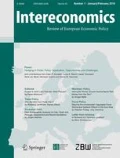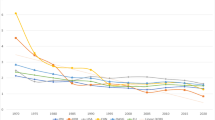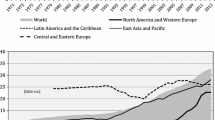Abstract
The goal of phasing out, and ultimately eliminating, the differential treatment in trade presently accorded to developing countries was incorporated into the GATT during the Tokyo Round. What are the arguments in favour of this process of “graduation” and what would be its disadvantages? Which criteria should be applied to the selection of countries for graduation?
Similar content being viewed by others
References
GATT: The Tokyo Round of Multilateral Trade Negotiations, Geneva, April 1979, p. 9.
GATT, op. cit., The Tokyo Round of Multilateral Trade Negotiations, Geneva, April 1979, p. 149.
For an extensive treatment, see I. Frank: The “Graduation” Issue for LDCs, in: Journal of World Trade Law, Vol. 13, No. 4, 1979, pp. 289–302.
For a precise description, see e.g. T. Murray: Trade Preferences for Developing Countries, London 1977; A. Weston, V. Cable, A. Hewitt: The EEC's Generalised System of Preferences, ODI, 1980; or A. Borrmann, C. Borrmann, M. Stegger: Das Allgemeine Zollpräferenzsystem der EG, Hamburg 1979.
See e.g. T. Murray: How Helpful is the Generalized System of Preferences to Developing Countries? in: Economic Journal, Vol. 83, 1973, pp. 449–455.
UNCTAD TD/B/C.5/66, 20 February 1980 (prepared by T. Murray): Evaluation of the Trade Benefits under the United States Scheme of Generalized Preferences.
A. Sapir: Trade Benefits under the EEC Generalized System of Preferences, in: European Economic Review, Vol. 25, 1981, pp. 339–355.
A. Sapir, op. cit. Trade Benefits under the EEC Generalized System of Preferences, in: European Economic Review, Vol. 25, 1981, p. 352.
A. Borrmann, C. Borrmann, M. Stegger: The Impact of the GSP on Imports, in: INTERECONOMICS, No. 5, 1979, p. 224.
R. E. Baldwin, T. Murray: MFN Tariff Reduction and Developing Country Trade Benefits under the GSP, in: The Economic Journal, Vol. 87, March 1977, pp. 33–46.
This is partly recognized in a recent OECD study: Development Cooperation, 1982 Review, OECD, Paris 1982, Ch. 12, dealing with “new” NICs.
See for a general discussion e.g. OECD, op. cit. Development Cooperation, 1982 Review, OECD, Paris 1982, Ch. 12, dealing with “new” NICs. or an older study by the OECD: The impact of the Newly Industrializing Countries on Production and Trade in Manufactures, OECD, Paris 1979.
According to the “Economisch Dagblad”, April 6th, 1983, p. 9, William Brock, US trade representative, has stated that goods worth 2.6 billion dollars have been taken out of the GSP of the US.
Author information
Authors and Affiliations
Rights and permissions
About this article
Cite this article
Koekkoek, K.A. On the case for graduation. Intereconomics 18, 225–229 (1983). https://doi.org/10.1007/BF02928222
Issue Date:
DOI: https://doi.org/10.1007/BF02928222




